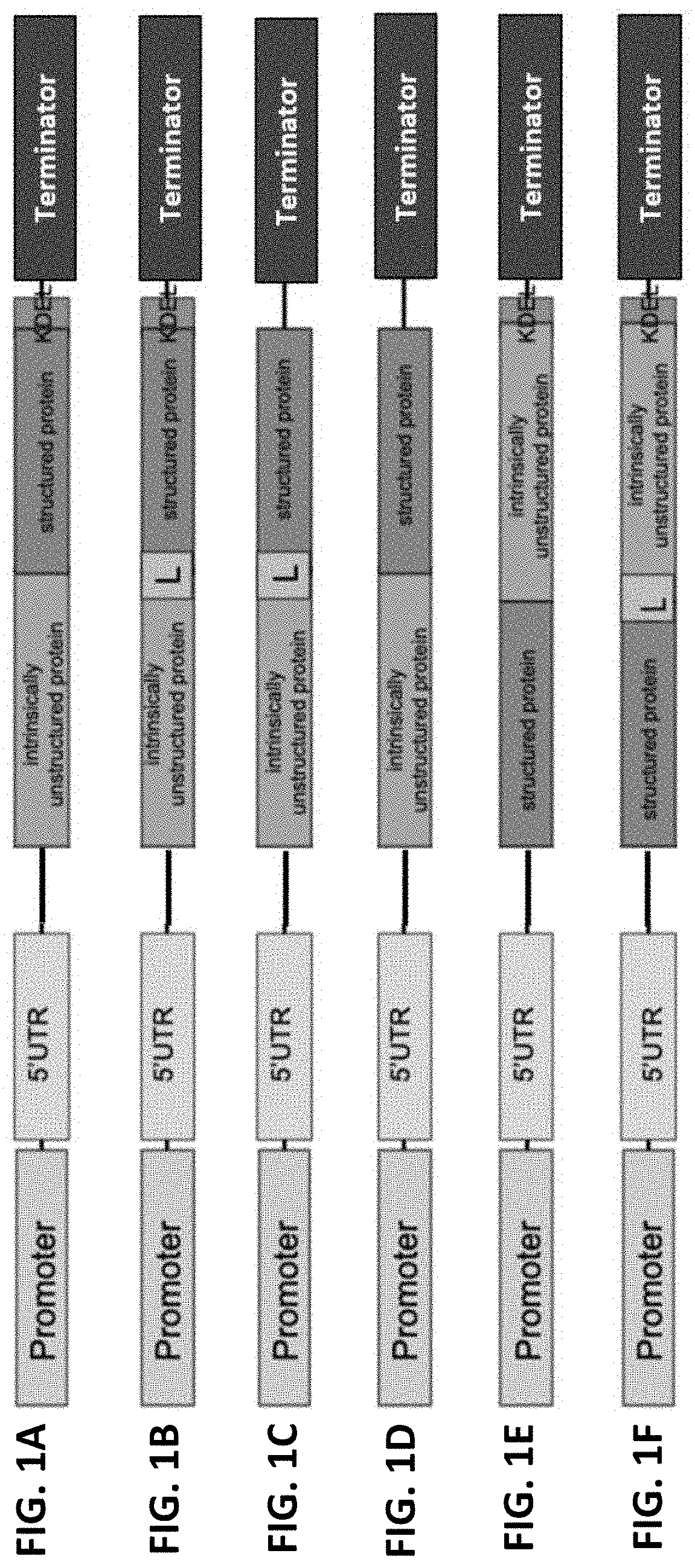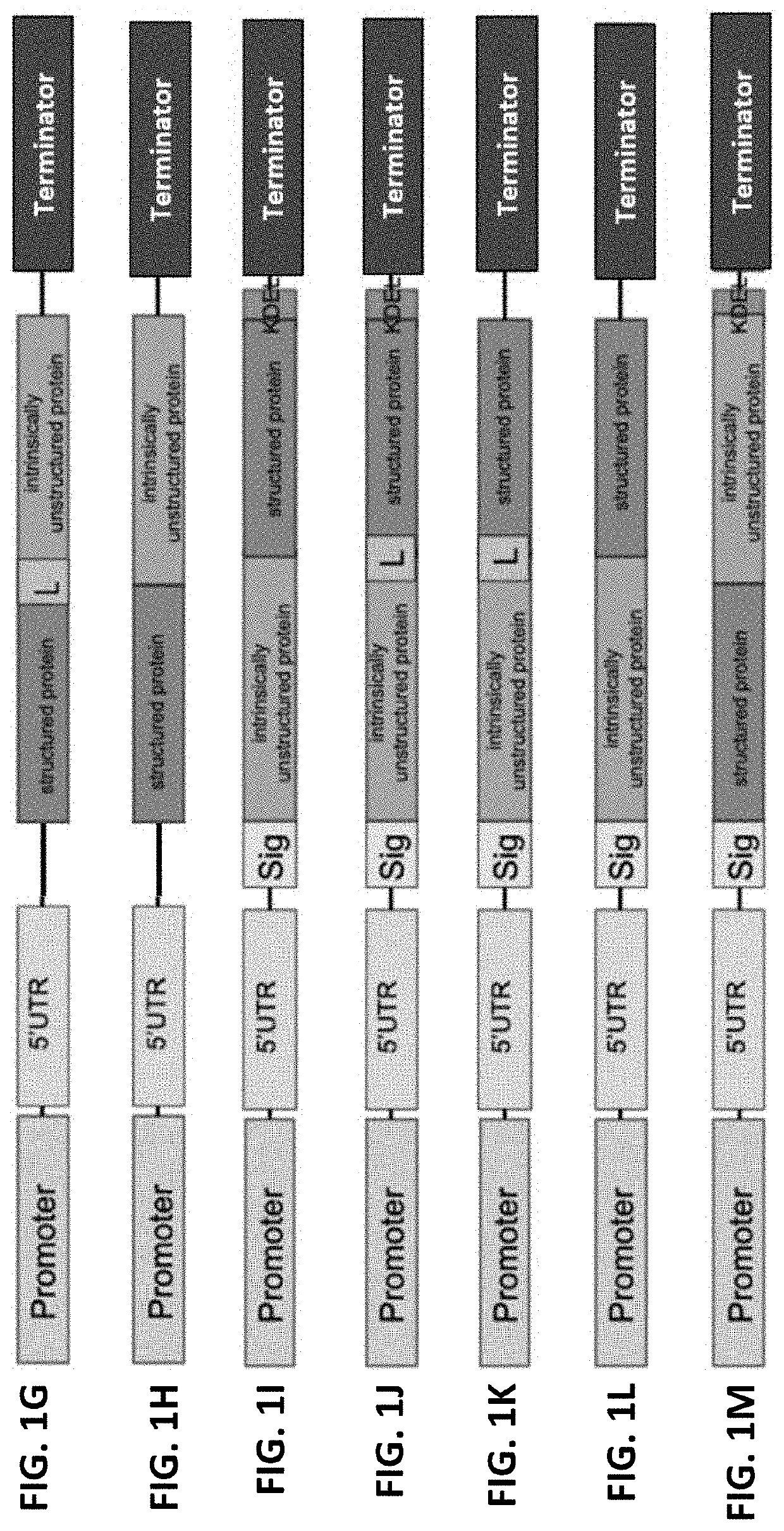Recombinant milk proteins
a technology of recombinant milk proteins and recombinant milk, which is applied in the direction of peptides, peptide sources, plasma/lactoglobulins, etc., can solve the problems of animal agriculture posing a serious risk to human health and not being able to meet the growing demand for food, and achieve the effect of stable expression
- Summary
- Abstract
- Description
- Claims
- Application Information
AI Technical Summary
Benefits of technology
Problems solved by technology
Method used
Image
Examples
example 1
ion of Expression Vectors for Plant Transformation for Stable Expression of Recombinant Fusion Proteins
Binary Vector Design
[0162]While a number of vectors may be utilized for expression of the fusion proteins disclosed herein, the example constructs described below were built in the binary pCAMBIA3300 (Creative Biogene, VET1372) vector, which was customized for soybean transformation and selection. In order to modify the vector, pCAMBIA3300 was digested with HindIII and AseI allowing the release of the vector backbone (LB T-DNA repeat_KanRpBR322 ori_pBR322 bom_pVS1 oriV_pVs1 repA_pVS1 StaA_RB T-DNA repeat). The 6598 bp vector backbone was gel extracted and a synthesized multiple cloning site (MCS) was ligated via In-Fusion cloning (In-Fusion® HD Cloning System CE, available on the world wide web at clontech.com) to allow modular vector modifications. A cassette containing the Arabidopsis thaliana Csr1.2 gene for acetolactate synthase was added to the vector backbone to be used as a ...
example 2
ation of Transgenic Events, Recombinant Protein Extraction and Detection
[0171]To quantify recombinant protein expression levels, DNA constructs such as those shown in FIG. 3-8 were transformed into soybean using transformation protocols well known in the art, for example, by bombardment or agrobacterium. Total soybean genomic DNA was isolated from the first trifoliate leaves of transgenic events using the PureGene tissue DNA isolation kit (product #158667: QIAGEN, Valencia, Calif., USA). Trifoliates were frozen in liquid nitrogen and pulverized. Cells were lysed using the PureGene Cell Lysis Buffer, proteins were precipitated using the PureGene Protein Precipitation Buffer, and DNA was precipitated from the resulting supernatant using ethanol. The DNA pellets were washed with 70% ethanol and resuspended in water.
[0172]Genomic DNA was quantified by the Quant-iT PicoGreen (product #P7589: ThermoFisher Scientific, Waltham, Mass., USA) assay as described by manufacturer, and 150 ng of D...
example 3
ositions
[0180]The transgenic plants expressing the recombinant fusion proteins described herein can produce milk proteins for the purpose of food industrial, non-food industrial, pharmaceutical, and commercial uses described in this disclosure. An illustrative method for making a food composition is provided in FIG. 11.
[0181]A fusion protein comprising an unstructured milk protein (para-κ-casein) and a structured mammalian protein (β-lactoglobulin) is expressed in a transgenic soybean plant. The fusion protein comprises a chymosin cleavage site between the para-κ-casein and the β-lactoglobulin.
[0182]The fusion protein is extracted from the plant. The fusion protein is then treated with chymosin, to separate the para-κ-casein from the β-lactoglobulin. The para-κ-casein is isolated and / or purified and used to make a food composition (e.g., cheese).
NUMBERED EMBODIMENTS
[0183]Notwithstanding the appended claims, the following numbered embodiments also form part of the instant disclosure....
PUM
| Property | Measurement | Unit |
|---|---|---|
| Fraction | aaaaa | aaaaa |
| Fraction | aaaaa | aaaaa |
| Atomic weight | aaaaa | aaaaa |
Abstract
Description
Claims
Application Information
 Login to View More
Login to View More - R&D
- Intellectual Property
- Life Sciences
- Materials
- Tech Scout
- Unparalleled Data Quality
- Higher Quality Content
- 60% Fewer Hallucinations
Browse by: Latest US Patents, China's latest patents, Technical Efficacy Thesaurus, Application Domain, Technology Topic, Popular Technical Reports.
© 2025 PatSnap. All rights reserved.Legal|Privacy policy|Modern Slavery Act Transparency Statement|Sitemap|About US| Contact US: help@patsnap.com



